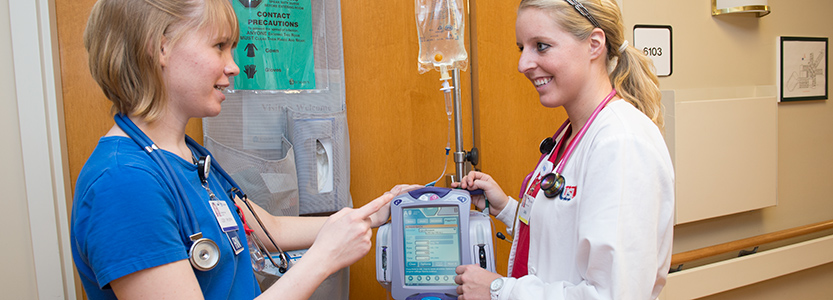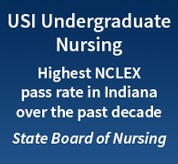Student and Program Outcomes
2022 Pass Rates
BSN Pass Rate NCLEX Exam: 96%
National NCLEX Pass Rates https://www.ncsbn.org/1237.htm
FNP Certification Exam: Pending (AANP & AANP)
AGNP-Acute Certification Exam: Pending (ANCC)
CNS Certification Exam: Pending % (ANCC)
PMHNP Certification Exam: Pending (ANCC)
AGPCNP Certification Exam: Pending (AANP & ANCC)
2021 Pass Rates
BSN Pass Rate NCLEX Exam: 94%
FNP Certification Exam: 100% (AANP & AANP)
AGNP-Acute Certification Exam: 100% (ANCC)
CNS Certification Exam: % (ANCC)
PMHNP Certification Exam: 100% (ANCC)
AGPCNP Certification Exam: 100% (AANP & ANCC)
2020 Pass Rates
BSN Pass Rate NCLEX Exam: 98.46%
FNP Certification Exam: 100% (AANP)
AGNP-Acute Certification Exam: 100% (ANCC)
CNS Certification Exam: % (ANCC)
PMHNP Certification Exam: 95% (ANCC)
AGPCNP Certification Exam: 100% (AANP)
2019 Pass Rates
BSN Pass Rate NCLEX Exam: 100%
FNP Certification Exam: 98-100% (ANCC and AANP)
AGNP-Acute Certification Exam: 100% (ANCC)
CNS Certification Exam: 100% (ANCC)
PMHNP Certification Exam: 100% (ANCC)
AGPCNP Certification Exam: 100% (ANCC and AANP)
2018 Pass Rates
BSN Pass Rate NCLEX Exam: 96.49%
FNP Certification Exam: 100% (ANCC and AANP)
AGNP-Acute Certification Exam: 100% (ANCC)
CNS Certification Exam: 100% (ANCC)
PMHNP Certification Exam: 100% (ANCC)
AGPCNP Certification Exam: 100% (ANCC and AANP)
2017 Pass Rates
BSN Pass Rate NCLEX Exam: 98%
FNP Certification Exam: 100% (ANCC and AANP)
AGNP-Acute Certification Exam: 100% (ANCC)
CNS Certification Exam: 100% (ANCC)
PMHNP Certification Exam: 87.5% (ANCC)
AGPCNP Certification Exam: 100% (ANCC and AANP)
2016 Pass Rates
BSN Pass Rate NCLEX Exam: 97.94%
FNP Certification Exam: 98% (AANP) 100% (ANCC)
AGNP-Acute Certification Exam: 100% (ANCC)
CNS Certification Exam: 100% (ANCC)
PMHNP Certification Exam: 100% (ANCC)
AGPCNP Certification Exam: 100% (ANCC and AANP)
2015 Pass Rates
BSN Pass Rate NCLEX Exam: May = 97.7% December = 100%
FNP Certification Exam: 96.5% (AANP) 86% (ANCC)
AGNP-Acute Certification Exam: 90% (ANCC)
CNS Certification Exam: 100% (ANCC)
PMHNP Certification Exam: 100% (ANCC)
2014 Pass Rates
BSN Pass Rate NCLEX Exam: May = 98.6% December = 100%
FNP Certification Exam: 98% (AANP) 80% (ANCC)
AGNP-Acute Certification Exam: 100% (ANCC)
CNS Certification Exam: 100% (ANCC)
PMHNP Certification Exam: 100% (ANCC)
2013 Pass Rates
BSN Pass Rate NCLEX Exam: 96%
FNP Certification Exam: 100%
AGNP-Acute Certification Exam: 100%
CNS Certification Exam: 100%
PMHNP Certification Exam: 100%
2012 Pass Rates
BSN Pass Rate NCLEX Exam: 96%
BSN Pass Rate NCLEX Exam: 100%
FNP Certification Exam: 100%
AGNP-Acute Certification Exam: 100%
CNS Certification Exam: 100%
BSN Outcomes
The University of Southern Indiana BSN graduate is:
A caring practitioner who emphasizes interpersonal relationships while practicing patient centered, holistic, and culturally congruent care.
A critical thinker who integrates best current evidence, clinical expertise, patient/family preferences and values, to problem solve issues related to the healthcare consumer, self, healthcare environment, and community.
A knowledgeable practitioner who uses information, resources, and technology to support decision-making.
A skillful practitioner who provides safe, competent, effective care in diverse environments.
A practitioner who communicates effectively within inter-professional teams, fostering mutual respect and shared decision-making to achieve quality care.
An ethical practitioner who demonstrates professional values and leadership while adhering to practice standards.
The University of Southern Indiana MSN graduate is prepared to:
- Synthesize knowledge and concepts from nursing, other sciences, and humanities as a foundation for advanced nursing practice.
- Integrate critical thinking to provide advanced nursing care, focusing on safety and prevention of medical error in diverse populations.
- Participate in systematic inquiry and apply current evidence to improve patient outcomes and enhance nursing as a profession.
- Integrate knowledge of legal, socioeconomic, political, cultural, and ethical forces that affect patient outcomes and health care environments in advanced nursing practice.
- Function as an advocate, leader, and change agent to plan, implement, and evaluate health care in collaboration with inter-professional teams, consumers, and policy makers.
- Provide leadership to maintain and promote the professional values of patient-centered care, patient advocacy, professional integrity, accountability, and lifelong learning.
- Integrate data to monitor the outcomes of care processes and use improvement methods to design and test changes to continuously improve the quality and safety of health care systems.
- Integrate information and technology to communicate, manage knowledge, mitigate error, and support decision making.
Acute NP
Adult-Gerontology Nurse Practitioner, Acute
Synthesize knowledge from nursing theories, the humanities, and evidence-based scientific clinical guidelines to guide assessment of health status of adults across the lifespan.
Demonstrate advanced practice clinical decision making, integrating critical thinking, to interpret patient and diagnostic test data and formulate differential diagnoses and a plan of care for adults across the lifespan.
Design and implement a mutually agreed upon management plan and therapeutic interventions with adult patients and families across the lifespan.
Evaluate and revise the documented management plan based on patient/family findings, problems and expected outcomes of treatment.
Apply adult assessment methodologies and research findings to improve and evaluate the care of adult patients and families across the adult lifespan.
Advocate for patients and families to provide cost-effective, culturally competent, ethical, quality care in and across health care settings.
Model responsibility for continued professional development, integrity, accountability, competence, and credentialing as an acute care nurse practitioner.
CNS
Adult-Gerontology Clinical Nurse Specialist
Provide expert outcome-oriented nursing therapeutics for complex patients to promote health, well-being, and quality of life.
Manage the integration and coordination of patient care services across the health care continuum.
Design and implement patient and staff educational programs for promotion of positive health care outcomes.
Consult and collaborate with members of the health care team to support the delivery of quality patient care.
Utilize research methodology and evidence to investigate, promote, and evaluate nursing therapies that produce positive patient care outcomes.
Model responsibility for continued professional development, integrity, accountability, competence, and credentialing as a clinical nurse specialist.
PCNP
Adult-Gerontology Primary Care Nurse Practitioner
Synthesize knowledge from nursing theories, humanities, and evidence-based scientific clinical guidelines to guide assessment of health status for patients of all ages.
Demonstrate advanced practice clinical decision making, integrating critical thinking, to interpret patient and diagnostic test data and formulate differential diagnoses and a plan of care for patients from age 13 through oldest-old.
Design and implement a mutually agreed upon management plan and therapeutic interventions with patients and families.
Evaluate and revise the documented management plans.
Apply assessment methodologies and research findings to improve and evaluate the care of older adolescents and adult patients throughout their lifespans.
Advocate for patients and families to provide cost-effective, culturally competent, ethical, quality care in and across healthcare settings.
Model responsibility for continued professional development, integrity, accountability, competence, and credentialing as an adult-gerontology primary care nurse practitioner.
FNP
Family Nurse Practitioner
Synthesize knowledge from nursing theories, the humanities, and evidence-based scientific clinical guidelines to guide assessment of health status for patients of all ages.
Demonstrate advanced practice clinical decision making, integrating critical thinking, to interpret patient and diagnostic test data and formulate differential diagnoses and a plan of care for patients and families across the lifespan.
Design and implement a mutually agreed upon management plan and therapeutic interventions with patients and families across the lifespan.
Evaluate and revise the documented management plan based on patient/family findings, problems and expected outcomes of treatment.
Apply family assessment methodologies and research findings to improve and evaluate the care of patients and families across the lifespan.
Advocate for patients and families to provide cost-effective, culturally competent, ethical, quality care in and across health care settings.
Model responsibility for continued professional development, integrity, accountability, competence and credentialing as a family nurse practitioner.
PMHNP
Psychiatric Mental Health Nurse Practitioner
Provide expert outcome-oriented nursing therapeutics for patients with mental health problems to promote improved health and enhanced quality of life.
Manage, integrate and coordinate patient care services across the mental health care continuum.
Develop and provide patient and staff educational services to promote positive patient health care outcomes.
Consult and collaborate with members of the multidisciplinary health care team to support delivery of quality patient care.
Incorporate best practice evidence to investigate, promote, and evaluate nursing therapies and pharmacotherapy that support evidence for positive patient care outcomes.
Advocate for patients and families to provide cost-effective, culturally competent, ethical, quality care in a variety of health care settings.
Model responsibility for continued professional development, integrity, accountability, competence, and credentialing as a family psychiatric mental health nurse practitioner.
NED
Nursing Education
Integrate the roles of faculty scholarship, teaching and service.
Formulate learning objectives, learning strategies and activities in relationship to theories of teaching and learning.
Facilitate relationships between students and clinical agencies demonstrating an expertise in nursing and the ability to influence change.
Advocate for students and develop mutual respect through advising, counseling, understanding diversity, conveying a sense of caring and serving as a preceptor and role model.
Integrate into the role of a faculty member participation in institutional committees and leadership to the school, institution and the profession.
Disseminate knowledge of teaching expertise through publication and presentation of innovative teaching methods and outcomes of scholarly work.
Integrate innovative and creative teaching strategies that consider increasing use of technology in education, changing perspectives on teaching and learning and the needs of a global society.
NML
Nursing Management and Leadership
Integrate critical thinking skills in complex, multi-dimensional nursing management and leadership situations through the use of economic, finance, marketing and administration theories and principles.
Analyze the use of management and leadership principles and quality management skills in health care organizations.
Advance nursing knowledge through research in nursing management, leadership and health care policy.
Incorporate global influences and the use of information and communication technology into the nursing management and leadership role.
Integrate legal and ethical standards, professional values, and lifelong learning into the nursing management and leadership role.
Upon completion of this program, the DNP graduate will be able to:
Integrate nursing science with knowledge from ethics and the biophysical, psychosocial, analytical, and organizational sciences as the basis for the highest level for nursing.
Develop and evaluate care delivery approaches that meet current and future needs of populations based upon scientific findings in nursing science, clinical sciences, and organizational, political, and economic sciences.
Use analytic methods to appraise existing literature and other evidence to determine and implement the best evidence for practice.
Serve as a leader in the development and implementation of institutional, local, state, federal, and international health policy.
Advocate for the clients and the nursing profession within government, business, education, and healthcare communities.
Collaborate with interprofessional teams to analyze complex practice and organizational issues in leading change and to improve client, population, and system health outcomes.
Analyze epidemiological, bio-statistical, environmental, and other scientific data related to individual, aggregate, population, and health.
Integrate advanced level of judgment, systems thinking, and accountability in designing, teaching, delivering, and evaluating evidence-based care to improve client and health care outcomes.
Develop and lead quality improvement initiatives within diverse health care.
Develop and disseminate practice-based initiatives that promote client safety and reduction of medical errors.



